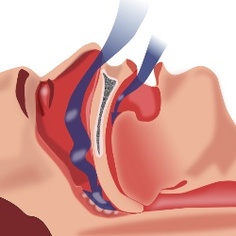 Sleep apnea is a condition wherein a person experiences breathing lapses during sleep. These pauses in breathing can last from seconds to minutes at a time; thus, the sleeping person receives insufficient oxygen. Oxygen is important for the proper circulation of the blood. When less oxygen is taken in, the body may compensate in various forms; resulting in illnesses and many other health problems. Here are the reasons why sleep apnea is a serious dysfunction that must not be taken lightly.
Sleep apnea is a condition wherein a person experiences breathing lapses during sleep. These pauses in breathing can last from seconds to minutes at a time; thus, the sleeping person receives insufficient oxygen. Oxygen is important for the proper circulation of the blood. When less oxygen is taken in, the body may compensate in various forms; resulting in illnesses and many other health problems. Here are the reasons why sleep apnea is a serious dysfunction that must not be taken lightly.
• Daytime Fatigue – People who have sleep apnea often feel tired during waking hours. Everything seems like a drag, and you feel sleepy all day. Since the body needs oxygen all the time, individuals with sleep apnea experience frequent night awakenings as the body responds to the low intake of oxygen. The brain tells the sleeping person to wake up and breathe occasionally; thus, resulting in a less restful sleep than a person who sleeps normally.
• Headache and Migraine – Sleep apnea often comes with teeth grinding that puts extreme pressure on the teeth. This causes headaches and migraines since the jaw has been working overnight.
• High Risk for Heart Attack and Stroke – Our circulatory system is responsible for circulating blood that contains air, digested food, water, and waste materials. If less oxygen is taken in than what our body requires, we become susceptible to diseases of the circulatory system such as heart attack, stroke, and even high blood pressure.
• Poor Performance in Daily Activities – People with sleep apnea are unable to maximize their potential. There are cases wherein sleep apnea can lead to accidents like vehicle crashes. Children with sleep apnea do not perform well in school. Likewise, adults at work are not able to give their best in performing their jobs.
• Irritability – Lack of sleep does not only affect you physically, but can also affect your mood. You easily get irritated over small problems and often feel depressed.
• Patients with Sleep Apnea Tend to Age Quickly – Lack of sleep, fatigue, and an unhealthy physique can take its toll on your physical appearance.
Who Are High Risk Individuals for Sleep Apnea?
• Studies have shown that sleep apnea mostly occurs in men than in women.
• Obesity can be a contributing factor.
• People who are over the age of 40 may experience sleep apnea.
• Individuals who have large tongues, large tonsils, and a small jaw bone may get obstructive sleep apnea.
• Sinusitis and allergies can lead to sleep apnea since the person breathes through the mouth.
Sleep Apnea and Your Dentist
Dentists like Dr. Compton can recommend two types of treatment to relieve patients with sleep apnea. Appliances may be worn during sleep, to clear the pathway for air to flow freely. Continuous Positive Airway Pressure (CPAP) may also be recommended so that the patient receives sufficient oxygen while sleeping. Dentists can determine which type of device is best suited for you. If you think sleep apnea is affecting you, don’t take sleeping pills or drugs to have a good night’s sleep. Rather seek a permanent form of treatment by visiting your trusted dental care professional. The sooner you are relieved of sleep apnea means that the sooner you’ll feel relief from its ill effects.
Image Courtesy Pinterest

